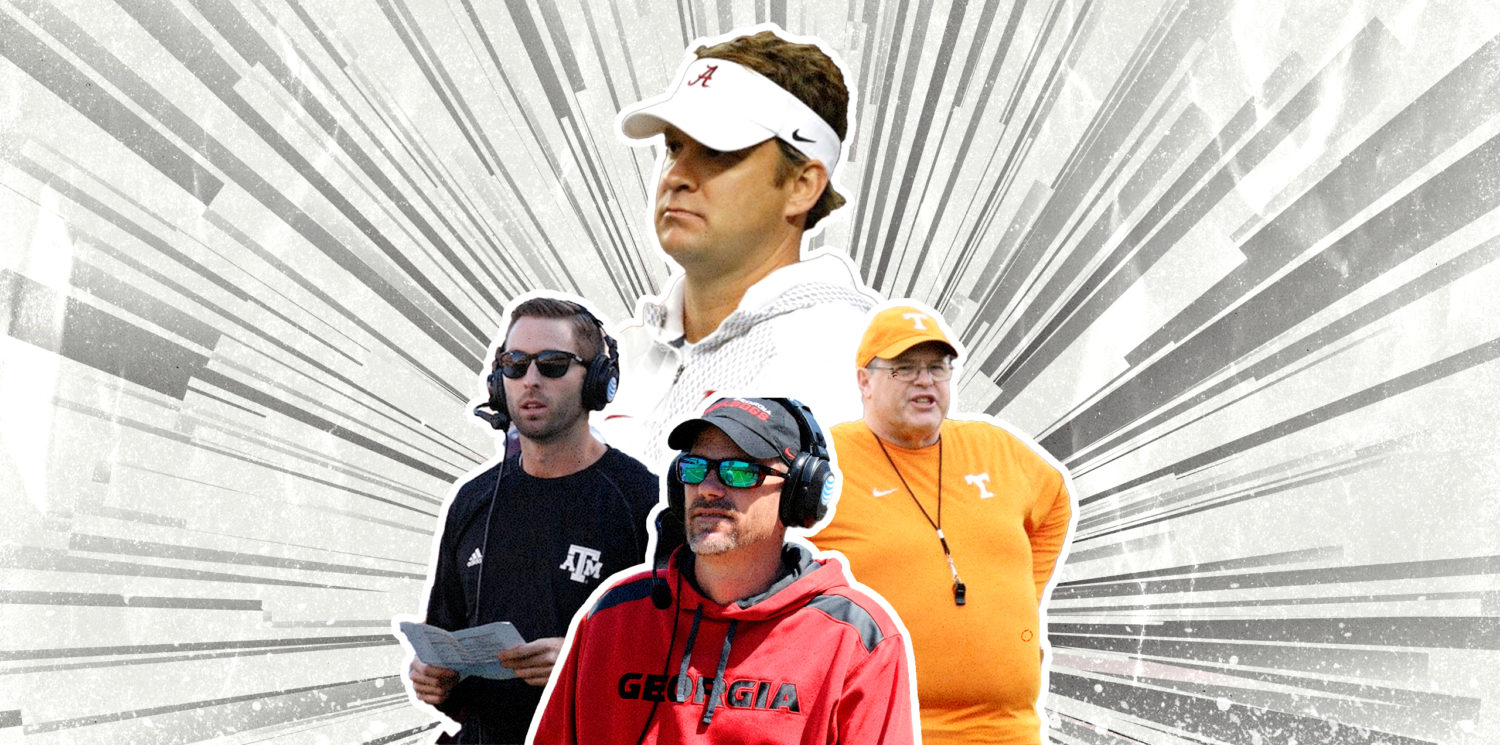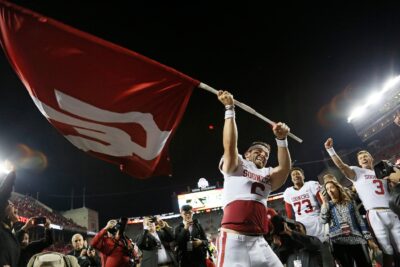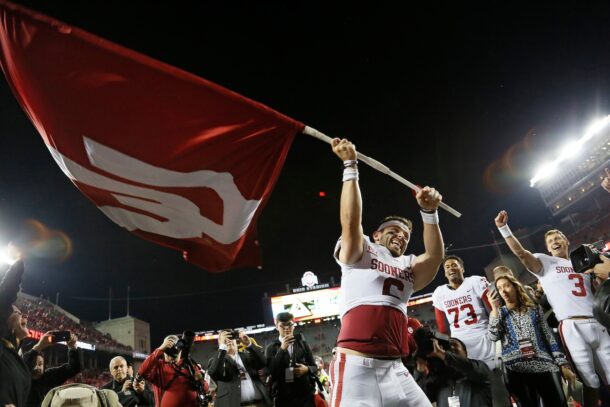
Our All-Decade countdown marches on with our list of the best offensive coordinators over the past 10 years in the Southeastern Conference. This list does not include any head coach who acted as his own offensive coordinator and did not consider the achievements of assistants that coached at schools outside of the SEC.
No. 15 Derek Dooley (Missouri)
Derek Dooley’s hire was stunning but proved to be a solid hire for Barry Odom in 2018. Missouri scored 30 or more points in 10 games with 3 of the program’s losses coming by a combined 8 points that season. While Drew Lock was the signal-caller for that unit, it was Missouri’s outstanding rushing attack that kept opponents guessing and opened things up for Lock to attack through the air. Kelly Bryant turned out to be a poor fit for the offense and once the injuries started to rack up for the graduate transfer in 2019, Dooley’s offense came unglued. We’ll never know how different things would have been had Bryant not been affected by injuries. The Mizzou offense was off to an outstanding start before its on-field leader went down.
No. 14 Josh Henson (Missouri)
Missouri won 23 games in the first 2 seasons and scored 30 or more points 17 times during that stretch under Josh Henson. Henson helped senior quarterback James Franklin finish his career with an SEC East title and kept the offensive momentum going under freshman quarterback Maty Mauk. Henry Josey and Russell Hansbrough each had career years in Henson’s offense, as both players rushed for over 1,000 yards and had double-digit rushing scores as featured backs. If not for running into a red-hot Auburn team in the 2013 SEC Championship Game, Missouri likely would have won the SEC title that season.
No. 13 Mike Locksley (Alabama)
The 2018 Broyles Award winner, Mike Locksley inherited a talented group in Tuscaloosa, but managing talent (and expectations) can be a burden few coaches can handle. For the most part, Locksley handled that very well until Alabama’s National Championship Game appearance against Clemson. The RPO staple of Alabama’s attack under Tua Tagovailoa was brought to Tuscaloosa by Locksley and continues to work regardless of whether defenses know it’s coming or not.
No. 12 Eddie Gran (Kentucky)
Kentucky’s offense has not been historically powerful under Eddie Gran but it has played complementary and efficient football in recent seasons. Whether with Benny Snell or Lynn Bowden, Kentucky’s offense has turned into a rushing machine under Gran. While the offense has been 1-dimensional, more often than not, defenses still can’t stop it.
No. 11 Steve Ensminger (LSU)
LSU’s offensive coordinator wasn’t the big-name hire Ed Orgeron promised when he took over in Baton Rouge, but he proved to be the perfect coach for the job. One of Orgeron’s first acts as interim LSU coach was to promote Ensminger to OC; LSU’s offense took off immediately the following week. The program needed Joe Brady to take the offense to the historic level it’s operating at, but Ensminger deserves plenty of praise for his part in the offense’s success in 2019 and for handling the situation like he has this season. Many of the coaches on this list likely would not have done the same.
No. 10 Phil Longo (Ole Miss)
When Hugh Freeze was given the boot in Oxford, it would have been reasonable to expect the offense taking a step back. Thanks to Phil Longo, that never happened. When Shea Patterson went down due to injury midseason, a relatively unknown former junior college QB named Jordan Ta’amu entered the lineup. Longo managed to seamlessly transition Ta’amu into the lineup. Instead of a drop-off. the Rebels got better. The defense was a disaster when Longo was running the offense, but his offense was always a dangerous unit opponents had to respect.
No. 9 Mike DeBord (Tennessee)
Tennessee never reached its potential during the Butch Jones era, but you can’t blame Mike DeBord. His hire might have seemed like a stretch at the time, but the team’s offensive line and running game thrived while Joshua Dobbs played the best football of his career under DeBord. Tennessee broke several school records during the 2 years DeBord was running the offense. Had the defense done its part, more people would recognize the job DeBord did on Rocky Top.
No. 8 Dan Enos (Arkansas)
Dan Enos took an unconventional route to Fayetteville, as he left his job serving as the head coach of a winning Central Michigan program to run the Razorbacks’ offense, but he proved to be the best man Bret Bielema could have hired. Brandon Allen was considered more of a punching bag than a successful quarterback when Enos arrived. A year later, Allen left the school following one of the most successful seasons in program history. Enos then managed to develop Austin Allen into a solid quarterback before injuries and an ineffective line derailed the offense.
No. 7 Dan Werner (Ole Miss)
A 2-time Broyles Award nominee, Dan Werner and Hugh Freeze led Ole Miss to some historic highs. Werner, also serving as Ole Miss’ quarterbacks coach, helped develop junior college prospect Bo Wallace into a quality starter in the SEC before Chad Kelly arrived and took the offense to new heights. During the 2014 and 2015 seasons, not only was Ole Miss the only SEC team to defeat Alabama, the offense was the only program to score 20 or more both seasons against the Tide’s defense.
No. 6 Jim McElwain (Alabama)
Say what you will about his Florida offenses, but Jim McElwain was an effective play-caller for the Crimson Tide during the team’s 2011 national championship run. Alabama’s offensive gameplan against LSU’s historic defense in the title game was masterful as the Tigers had only surrendered more than 17 points twice that season and not since Sept. 21.
No. 5 Kliff Kingbury (Texas A&M)
Steve Spurrier deserves the credit for revolutionizing what an offense could be in the SEC, but you could make the case that Kliff Kingsbury had a similar impact on what SEC offenses would evolve into following Johnny Manziel’s historic debut season for the Aggies. The historic offenses being run in Tuscaloosa and Baton Rouge might not be in place if not for Kevin Sumlin and Kingsbury ripping apart SEC defenses in 2012.
No. 4 Gus Malzahn (Auburn)
Gus Malzahn’s tenure as Auburn’s offensive coordinator was short, but it was spectacular. In his 2nd and final year serving as OC under Gene Chizik, Auburn won the national championship, Cam Newton won the Heisman Trophy and became the No. 1 overall pick in the 2011 NFL Draft and Malzahn won the Broyles Award given to the nation’s top assistant coach. That historic season is reason enough to put Malzahn this high on the list.
No. 3 Mike Bobo (Georgia)
There’s no doubt Mike Bobo had a lot of talent to work with, but he got the most out of it. Aaron Murray still holds many SEC and Georgia all-time records after playing under Bobo and he helped develop Matthew Stafford into the No. 1 overall selection in the 2009 NFL Draft. Georgia had the SEC’s most efficient offense by the time he left. Bobo’s departure was the beginning of the end for Mark Richt’s time in Athens.
No. 2 Jim Chaney (Tennessee, Arkansas, Georgia, Tennessee)
One of the more traveled assistants in recent SEC history, Jim Chaney has been successful far more often than not. Outside of running efficient and explosive offenses, the next-best quality Chaney has displayed during the decade is the ability to adapt to his players. His first run on Rocky Top featured a pass-heavy attack, while the offense was largely ground and pound at Arkansas and Georgia. Back again at Tennessee, the Vols displayed the ability to play bully ball when necessary while leaning primarily on the passing attack once Jarrett Guaratano and the receivers had a firm grasp on the system.
No. 1 Lane Kiffin (Alabama)
It’s easy to look back and think Lane Kiffin was an easy hire for Nick Saban to make, but it was actually very controversial. While many mocked the hire, Kiffin played a huge part in Alabama’s 30-3 run while he was on staff in Tuscaloosa and was instrumental in updating the Crimson Tide’s offensive attack. Kiffin also displayed an outstanding ability to adapt to his personnel as he ran the offense through Amari Cooper one year and immediately focused the offense through Derrick Henry the following season and then retooled again around Jalen Hurts in 2016.
A graduate of the University of Tennessee, Michael Wayne Bratton oversees the news coverage for Saturday Down South. Michael previously worked for FOX Sports and NFL.com







